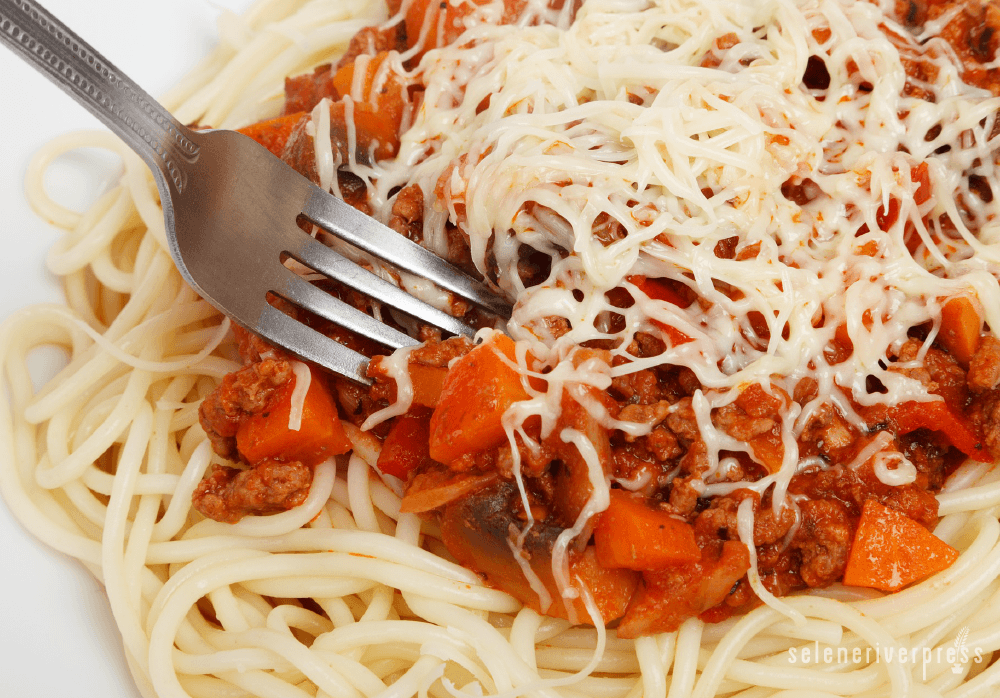Remember the days when your athletic coach would encourage you to “carb load” before some big matchup? Heck, the matchup didn’t even have to be big. My high school track coach used to encourage us to eat a big plate of pasta the night before any old Tuesday afternoon meet. Knowing what we know now, I thought for sure those days were long gone. I was wrong.
At lunch with some friends a couple of weeks ago, one of them mentioned that her daughter’s cross-country coach shared this supposedly sage advice with the team just days before. Apparently, “go forth and carb load” is a motto still adhered to by some. Luckily, this friend of mine knew the truth and took the opportunity to teach her daughter about the myth of carb loading.
The theory behind this myth is that carb loading stores up fuel in your muscles and liver, which helps you perform at your peak during an athletic event. While there is a grain (pun intended) of truth to this, it’s about far more than just going home and eating a bowl of noodles.
There are two types of carbohydrates: simple (sugars) and complex (starches). The body breaks down both types into simple sugars, or glucose, which absorbs into your bloodstream and provides energy where your body needs it. Providing your body with the energy it needs to do everything it does is good and necessary. The question is, are carbs the best way to get this energy?
Carbs aren’t all bad when you eat the right ones, paired with the right foods. But your body stores excess glucose in the liver as glycogen, which is then converted into body fat.
What are the right kind of carbs? Just like any other food choice you make, stick to carbs that are unrefined or as close to their natural state as possible. When we choose the apple instead of the apple juice or the whole grains instead of the sliced white bread, we’re providing our bodies with the vitamins, minerals, and fiber that nature intended. The refining process strips these nutrients from food, turning them into “empty” calories. Or, as Sally Fallon explains in Nourishing Traditions, refined carbs are more like “negative” calories because they require the body’s reserves of certain nutrients just to digest them. For example, B vitamins must be present in order for your body to break down carbs, yet this is one of the nutrients that’s taken out during the refining process. Your body has to pull it from somewhere to deal with what you’ve eaten.
What should you pair carbs with? Fallon points out that it’s crucial to include fats and proteins with the carbs in your meal. This combination allows your body to slowly release the glucose into your bloodstream for a steady dose of energy over several hours. When you eat only carbs alone, especially the refined varieties, glucose rushes into your bloodstream, causing all sorts of turmoil with your endocrine system. Your pancreas, adrenal glands, and thyroid all play a part in regulating your blood sugar levels. When they’re regularly overworked, they stop working efficiently. A rush of glucose into your bloodstream spikes everything for a brief time, and then brings your body crashing down. That doesn’t exactly offer up peak performance for your cross-country meet.
What does an athlete really need? Of course, most of us are pretty casual athletes who can get by with a balanced diet of nutrient dense whole foods. Fats provide a longer lasting energy source for your athletic performance. Proteins build muscle and help your body repair itself from even a minor injury. And while staying hydrated with water is crucial for all of us, it’s especially crucial for athletes. Interestingly, Dr. Royal Lee discusses the fact that we don’t need to consume carbs to live a healthy life in his article “Carbohydrate Not Essential.” It is the vitamins and minerals in unrefined carbs that are the essential factor to optimal health.
It seems that our kids’ athletic coaches could be making much better suggestions. Until that becomes the norm, we’ll have to rely on our own self-health knowledge to help our families thrive in whatever activities they pursue.
What’s your favorite food or nutrition myth that still circulates in your conversations?




You’ve stated what an athlete shouldn’t eat, but what are some practical foods for a competitive swimmer who is in a swim meet for 2 to 3 days?
Good Morning Diane. Thank you for taking the time to read this post and comment. Swimming is, without a doubt, one of those activities that requires a lot of energy and leaves a person super hungry. As I mentioned, it isn’t about athletes avoiding carbs altogether. It is about eating the unrefined ones and pairing them with fats and proteins.
I am not a certified nutritionist. However, being the self-healther that I am, this is how I would approach planning meals for a competitive swimmer in my house. A good breakfast (or even lunch) could be a frittata with spinach, onion, and mushrooms sautéed in grass-fed butter or coconut oil. If you want some toast, go for the whole grain slice. Snacks could be something like apple slices with your favorite nut butter for dipping, beef jerky, or hard boiled eggs. To celebrate your accomplishments, your supper could be a lovely steak, baked sweet potato with a pat of butter, and a salad with your favorite greens.
Does that spark any ideas of what could work for you, Diane?
Thanks for laying out these differences between carbs. Great info, Paula!
You are welcome, Sam. Thank you for reading & commenting. :)